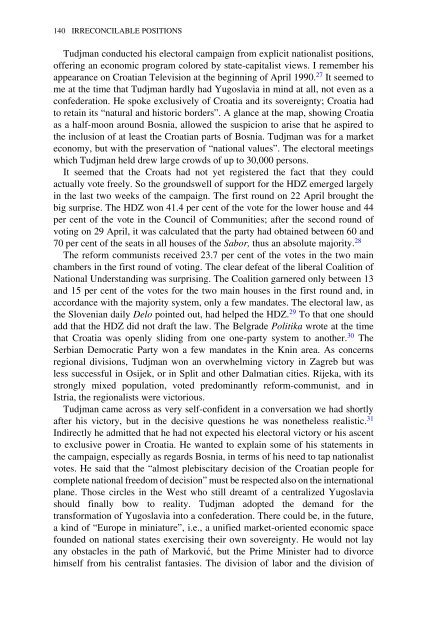Yugoslavia: A History of its Demise - Indymedia
Yugoslavia: A History of its Demise - Indymedia
Yugoslavia: A History of its Demise - Indymedia
You also want an ePaper? Increase the reach of your titles
YUMPU automatically turns print PDFs into web optimized ePapers that Google loves.
140 IRRECONCILABLE POSITIONS<br />
Tudjman conducted his electoral campaign from explicit nationalist positions,<br />
<strong>of</strong>fering an economic program colored by state-capitalist views. I remember his<br />
appearance on Croatian Television at the beginning <strong>of</strong> April 1990. 27 It seemed to<br />
me at the time that Tudjman hardly had <strong>Yugoslavia</strong> in mind at all, not even as a<br />
confederation. He spoke exclusively <strong>of</strong> Croatia and <strong>its</strong> sovereignty; Croatia had<br />
to retain <strong>its</strong> “natural and historic borders”. A glance at the map, showing Croatia<br />
as a half-moon around Bosnia, allowed the suspicion to arise that he aspired to<br />
the inclusion <strong>of</strong> at least the Croatian parts <strong>of</strong> Bosnia. Tudjman was for a market<br />
economy, but with the preservation <strong>of</strong> “national values”. The electoral meetings<br />
which Tudjman held drew large crowds <strong>of</strong> up to 30,000 persons.<br />
It seemed that the Croats had not yet registered the fact that they could<br />
actually vote freely. So the groundswell <strong>of</strong> support for the HDZ emerged largely<br />
in the last two weeks <strong>of</strong> the campaign. The first round on 22 April brought the<br />
big surprise. The HDZ won 41.4 per cent <strong>of</strong> the vote for the lower house and 44<br />
per cent <strong>of</strong> the vote in the Council <strong>of</strong> Communities; after the second round <strong>of</strong><br />
voting on 29 April, it was calculated that the party had obtained between 60 and<br />
70 per cent <strong>of</strong> the seats in all houses <strong>of</strong> the Sabor, thus an absolute majority. 28<br />
The reform communists received 23.7 per cent <strong>of</strong> the votes in the two main<br />
chambers in the first round <strong>of</strong> voting. The clear defeat <strong>of</strong> the liberal Coalition <strong>of</strong><br />
National Understanding was surprising. The Coalition garnered only between 13<br />
and 15 per cent <strong>of</strong> the votes for the two main houses in the first round and, in<br />
accordance with the majority system, only a few mandates. The electoral law, as<br />
the Slovenian daily Delo pointed out, had helped the HDZ. 29 To that one should<br />
add that the HDZ did not draft the law. The Belgrade Politika wrote at the time<br />
that Croatia was openly sliding from one one-party system to another. 30 The<br />
Serbian Democratic Party won a few mandates in the Knin area. As concerns<br />
regional divisions, Tudjman won an overwhelming victory in Zagreb but was<br />
less successful in Osijek, or in Split and other Dalmatian cities. Rijeka, with <strong>its</strong><br />
strongly mixed population, voted predominantly reform-communist, and in<br />
Istria, the regionalists were victorious.<br />
Tudjman came across as very self-confident in a conversation we had shortly<br />
after his victory, but in the decisive questions he was nonetheless realistic. 31<br />
Indirectly he admitted that he had not expected his electoral victory or his ascent<br />
to exclusive power in Croatia. He wanted to explain some <strong>of</strong> his statements in<br />
the campaign, especially as regards Bosnia, in terms <strong>of</strong> his need to tap nationalist<br />
votes. He said that the “almost plebiscitary decision <strong>of</strong> the Croatian people for<br />
complete national freedom <strong>of</strong> decision” must be respected also on the international<br />
plane. Those circles in the West who still dreamt <strong>of</strong> a centralized <strong>Yugoslavia</strong><br />
should finally bow to reality. Tudjman adopted the demand for the<br />
transformation <strong>of</strong> <strong>Yugoslavia</strong> into a confederation. There could be, in the future,<br />
a kind <strong>of</strong> “Europe in miniature”, i.e., a unified market-oriented economic space<br />
founded on national states exercising their own sovereignty. He would not lay<br />
any obstacles in the path <strong>of</strong> Marković, but the Prime Minister had to divorce<br />
himself from his centralist fantasies. The division <strong>of</strong> labor and the division <strong>of</strong>
















